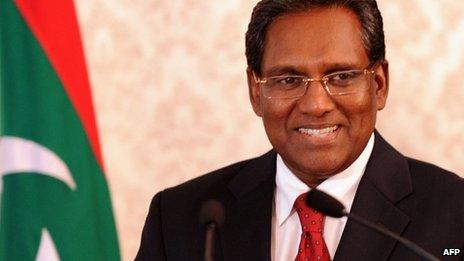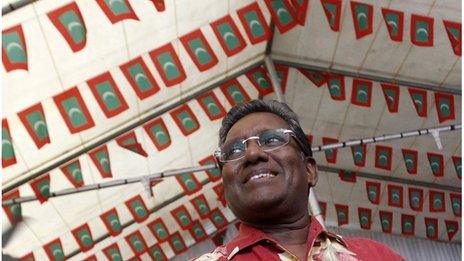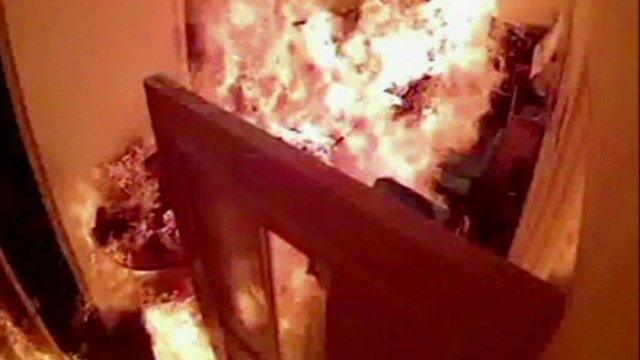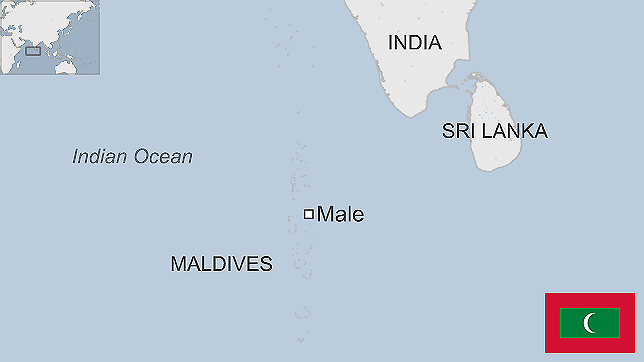Q&A: Maldives presidential elections
- Published

Incumbent President Mohamed Waheed is one of the four candidates
Maldivians will vote on 7 September in their first presidential election since former leader Mohamed Nasheed was forced to step down under controversial circumstances in what he describes as a coup.
Mr Nasheed was succeeded by then Vice-President Mohamed Waheed, who denies that a coup took place and says the transition was legal and necessary after the former leader resigned.
Maldives saw its first multi-party presidential elections in 2008, before which it was ruled for 30 years by Maumoon Abdul Gayoom, who is still said to have an influence on politics.
How does the election process work?
The first round of the election will be held on 7 September. If no candidate wins more than 50% of the votes, then a second round, or run-off, will be held.
According to the Election Commission, 240,302 people (above 18 years of age) are registered to vote, including 31,000 newly registered voters and 65,745 who have registered to vote at a location other than their home island.
In the 2008 elections there were about 209,000 registered voters, with an 85% turnout in the first round, and 86% in the second.
Parliamentary polls are to be held in 2014.
Who are the candidates?
There are four candidates in the bid for the presidency: former President Mohamed Nasheed, incumbent President Mohamed Waheed, business tycoon Gasim Ibrahim and former President Gayoom's half-brother Abdulla Yameen.
Mohamed Nasheed
Mr Nasheed leads the Maldivian Democratic Party (MDP), which is the single largest party with the highest number of registered members.
Mr Nasheed was the Maldives' first democratically elected president. His 2008 election win brought an end to Mr Gayoom's 30-year rule.
His running mate Mustafa Lutfi is a veteran politician and a former education minister. Mr Nasheed is seen as a strong contender.
Mohamed Waheed
Incumbent President Mohamed Waheed's Gaumee Itthihaad Party leads a coalition which includes the Dhivehi Rayithunge Party (DRP) and its leader Ahmed Thasmeen Ali, who is also Waheed's running mate.
Abdulla Yameen
Former President Gayoom's half-brother Abdulla Yameen is standing for the Progressive Party of Maldives (PPM), the second-largest party both inside and outside the parliament.
His running mate Mohamed Jameel Ahmed is a former home minister and a vocal opponent of Nasheed.
Gasim Ibrahim
Gasim Ibrahim is the presidential candidate of the Jumhooree Party. The prominent businessman heads the Villa Group of companies, described as one of the largest private conglomerates in the Maldives.
He is also said to be popular for his philanthropic work. Mr Ibrahim's party is contesting the election in coalition with the Dhivehi Qaumee Party (DQP) which is known for its opposition to the former Nasheed administration. Mr Ibrahim has picked the DQP's Hassan Saeed as his running mate.
What are the key issues?
Candidates have been largely focusing on religion, nationalism, economy and education in their election campaigns.
Mr Nasheed's party is focusing on economic development through reforms and tourism.
The MDP manifesto pledges tax reform, development projects and the setting up of a national development bank.
Other parties are using religion as a political tool to woo voters.
President Waheed's campaign promises to promote the teaching of Islam and to encourage religious thought and teachings. Other key areas include social protection, education and the environment.
Mr Gasim's manifesto also proposes to strengthen Islam in the Maldives, including the establishment of an Islamic university and making the Koran a mandatory school subject. Mr Gasim has also pledged to pursue oil exploration, increase taxes on the wealthy and provide laptops for students.
Mr Gasim's coalition includes the religious conservative Adhaalath Party. The alliance means that a win for Mr Gasim could bring the country closer to the party's dream of turning the Maldives into an Islamic state.
Mr Yameen has taken a strong position on law and order, campaigning in favour of implementing the death penalty and calling for harsher prison sentences.
Will the elections be fair?
Independent poll monitors, including teams from Transparency Maldives and the Commonwealth Secretariat, will observe the elections.
India has also said that it will send a team of former chief election commissioners as observers.
The controversial power transfer in 2012 has led many to question the legitimacy of the polls.
Concerns also remain over whether the nascent democracy will be able to sustain itself, given a background where the judiciary and military are said to function under heavy political influence.
Transparency Maldives, a non-governmental organisation, has warned that the election will take place against a backdrop of "uncertainty of democratic transition, existing polarisations and other challenges that have been aggravated by the controversial transfer of power on 7 February 2012".
What are the regional stakes?
India and China have been trying to extend their influence in the region and the Maldives' strategic location drives their engagement with the tiny island nation.
India arguably enjoyed greater influence in the Maldives under Mr Nasheed. Bilateral ties suffered a setback after President Waheed's administration evicted Indian infrastructure giant GMR which had been developing Male's airport under an agreement signed with Mr Nasheed's government.
India is also mindful of China's expanding military and economic footprint in the Maldives.
BBC Monitoring, external reports and analyses news from TV, radio, web and print media around the world. For more reports from BBC Monitoring, click here. You can follow BBC Monitoring on Twitter , externaland Facebook, external.
- Published12 October 2013

- Published8 October 2013

- Published10 March
